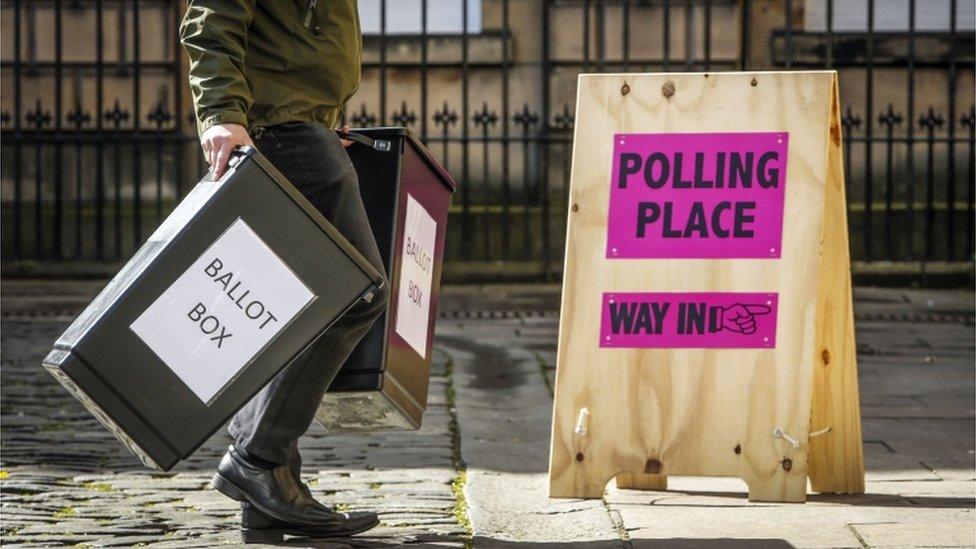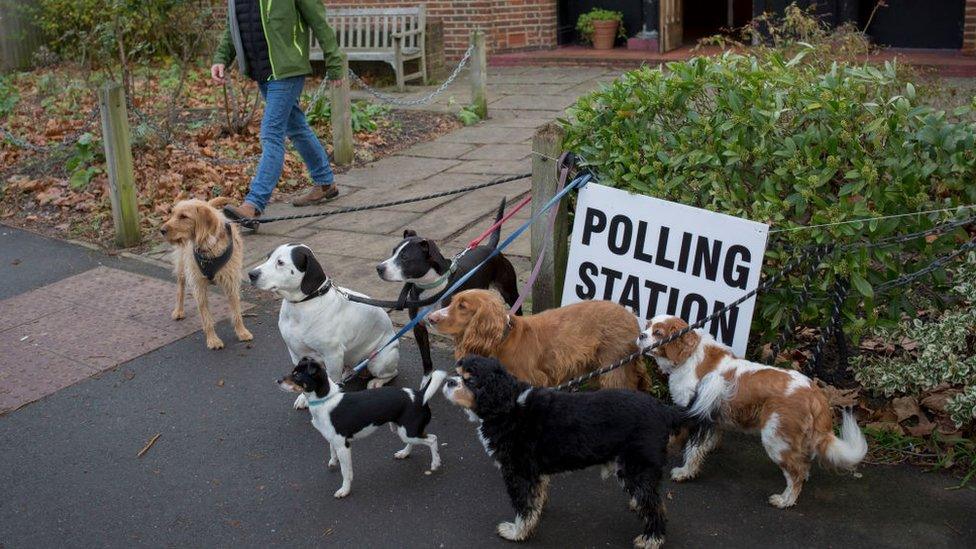Holyrood election count 'to be held over weekend'
- Published

The Scottish Parliament election is to go ahead on Thursday 6 May as planned - but it may be several days before the results are announced.
Voting is expected to go ahead as normal on a single day, despite ongoing Covid-19 restrictions.
However counting of ballots is expected to be conducted across Friday and Saturday, delaying the results.
Government minister Graeme Dey told MSPs that he was confident the election could be held safely as planned.
However he clashed with opposition members over whether First Minister Nicola Sturgeon would continue to front televised Covid-19 briefings during the campaign period.
MSPs have passed legislation allowing for a range of contingency plans should Covid-19 disrupt the election, including the option to delay polling day for six months.
However Mr Dey said he and the Electoral Management Board were "confident" that the vote could go ahead on 6 May.
The parliamentary business minister pointed out that dozens of countries have successfully held elections during the pandemic, while eight council by-elections were held in Scotland in 2020 - with 11 more to follow in the coming weeks.
Work will be done to make polling stations Covid-secure, with one-way systems and enhanced cleaning arrangements in place and extra staff on hand to encourage the wearing of face masks.
An advertising campaign has been run to encourage more postal voting, with a "significant rise" in applications already recorded ahead of the 6 April deadline.
Meanwhile anyone who tests positive for Covid-19 or who is in self-isolation will be able to apply for a proxy vote up until 17:00 on polling day.

Dogs may need to be more socially distant at polling stations in 2021
While voting will take place over a single day as usual, Mr Dey told MSPs that "results will take longer to arrive".
He said not all constituencies would be counted at the same time, with "most" counting taking place across Friday and Saturday.
Because of the way Holyrood's electoral system works, with regional list seats assigned on the basis of constituency results, it could be days before the outcome of the election becomes clear.
Measures are also being put in place to allow more traditional campaigning to take place, with candidates and their agents allowed to travel to constituencies.
Party leaders may also be allowed to travel to any given constituency, although Mr Dey said people should not travel between local areas for work that can be done from home.
Activists will be allowed to resume leafleting from 15 March if the "stay at home" order has been lifted by then, while face-to-face doorstep campaigning can start from 5 April if the infection rate has fallen low enough.
That will be based on whether the average infection rate across Scotland is at 50 per 100,000 or less and the test positivity rate is below 5% - both metrics the number the World Health Organisation has set for showing the pandemic is under control.
However MSPs were warned that if the infection rate exceeds 100 per 100,000 in any local authority area, canvassing would be suspended there until it fell again.
And other traditional campaigning activities like street stalls, hustings and giving voters a lift to the polling station will not be permitted.
'Obsession' with briefings
Opposition parties broadly welcomed the plans, but questioned when guidance would be published.
And both the Conservatives and Lib Dems asked whether it was appropriate for Ms Sturgeon to continue to front regular Covid-19 briefings during the election period.
Tory MSP Miles Briggs said it may be more appropriate for health officials to lead the briefings, while Lib Dem leader Willie Rennie said Ms Sturgeon would inevitably be asked political questions.
Mr Dey accused opposition members of having an "obsession about the public briefings", saying the first minister "provides assurance to the public" by hosting the televised events.
He added: "These are public health briefings that have proved essential throughout the past year - for Willie Rennie to imply that somehow the first minister would take advantage of that is frankly beneath him."

Would you like to hold politicians and prominent figures to account? Have your say across TV, radio and online, in a new BBC Scotland initiative.
We are looking for people from all parts of Scotland to join our voter panel and share your stories, questions and concerns in the run up to the Scottish elections.
We welcome applications from people of all backgrounds, as we are aiming to represent a diverse range of political opinion from across the whole of Scotland.
Just fill in the form below with full details here:

If you are reading this page on the BBC News app, you will need to visit the mobile version of the BBC website, or go to bbc.co.uk/scotvoters in a web browser, to submit your application. If you have any questions about your personal data, please contact us. The BBC will keep your information secure and will only share it in accordance with the Scotland Voter Panel 21's privacy notice and you agree to the BBC's Terms of Use.